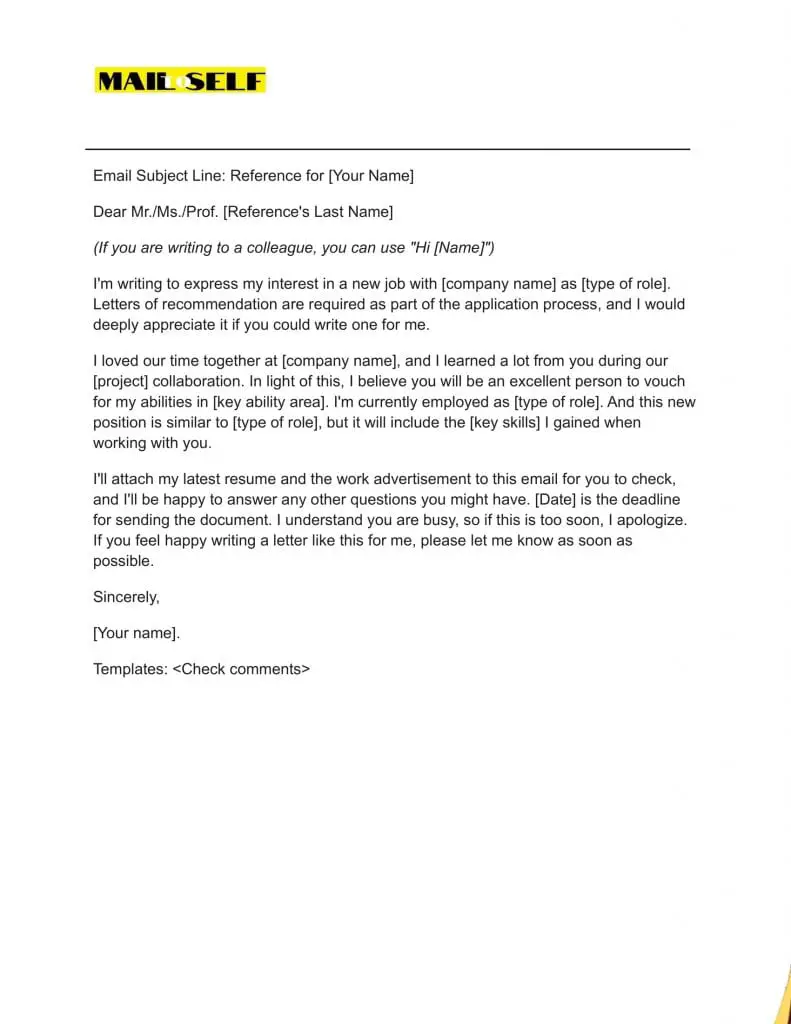Although you may have figured out what you’ll mean for yourself in your statement, asking someone to say that about you may be a little more difficult. Requesting recommendation letters will make you feel a range of feelings, from absolutely overwhelmed to outright uncomfortable.
What is a recommendation letter?
Many authority figures, particularly in academia, are accustomed to being asked to serve as moderators. It is not an extraordinary order, and it’s a required graduate of the education, internship, and career application procedure. However, it does necessitate some effort and dedication on behalf of the supervisor, and can not be overlooked.
Also, companies may ask for a letter of recommendation or a reference letter during the hiring process. It may happen before, during, or after the meeting. A strong letter of testimony will help you stand out even further from the crowd. Asking for a reference isn’t always straightforward, so use our guide to quickly draft a friendly request.
When do you need recommendation letters?
Although most companies seek referrals to letters of recommendation, there are times when letters of recommendation are requested or preferred.
Here are several scenarios in which you might want to get recommendation letters:
- Submitting an application to a structured program
- Attempting to apply for a new job at a different business
- Trying to apply for promotion inside the company
Tip:
When finding out whether a letter of recommendation is needed, carefully read the work or software application instructions. Letters of recommendation will not be needed in some cases. Offering them, nevertheless, can help you stand out in a crowd.
Who should you ask for references?
Companies search for several credentials for every applicant on average. Conversely, you will never get many supporters by your side, and having a range of groups take credit for you who are educated on certain facets of your skills can be beneficial. As a result, you’ll be able to choose the best references for each form of organization to which you’re referring.
· Ask people for a referral who may give you solid support:
Choose people who will provide you an influential recommendation. It’s crucial to be well-versed in your sources. You will ought to find someone that can validate where you worked, your role, your justification for quitting, specifics about your abilities, and why you’d be a valuable worker.
Also, it is crucial to get a clear sense of what your sources would mean about your qualifications and results. Check to see if the evidence given by your sources backs up what you’ve stated in your CV and discussed in your meetings. Inaccurate evidence will jeopardize the likelihood of acquiring a work offer or indeed lead to it being rejected.
· It must not always be from your bosses:
Many times, employer’s references are not needed. Other than former bosses, it’s completely safe to use references. References may include business acquaintances, academics or academic mentors, clients, and retailers. Furthermore, once you participate, you can use the organization’s founders or other members as informal guides.
· Recommendations should always be written, never verbal:
Obtain written recommendations. When you quit a job, you can ask your boss for a letter of recommendation, particularly if you’ve had a good professional relationship. It is a good thing to inquire as soon as possible. It is because, as time passes and people move on, people may not be aware of you in your former job. And, the recollection of how important you were to a company during your time there can diminish.
You’ll have documented evidence of your qualifications easily allowed to check to potential employers if you have letters in hand ahead of time. And what about those bosses you can’t ask for a recommendation letter from before you left? It’s entirely fair to call them right now and request a copy with your records.
Asking for recommendation by profession:
· Teachers or professors:
Obtaining a recommendation from professors or teachers can be beneficial to high school and college students. When seeking a referral, think of those with whom you had the most contact. You can check with those whom you were successful in your schooling, or were interested in your education in some way. The higher the endorsement, the more they can directly attest to your work as a student.
Note how, on top of their often hectic schedules, professors and teachers may receive a significant amount of recommendation requests at some times of the year. It’s critical to request recommendation letters from these people as quickly as practical, allowing them enough time to finish them.
· Coworkers and colleagues:
When it comes to career applications, professional referral letters can be very useful. Supervisors or colleagues who can testify to your work ethics, talents, and ability are the perfect people to ask to write your recommendation letters. You may also want to limit your inquiries to peers with even more technical expertise than yours.
· Friends and other acquaintances:
If at all practicable, stop asking peers for letters of recommendation. The buddy would likely be able to offer a different—but still useful—recommendation with a more informative and personal affidavit. If that was the case, find some friends who can give you an accurate evaluation of your talents. Also, you can ask someone who, ideally, is familiar with your competitive job market.
How long should you give someone to write a letter of recommendation?
Ideally, you must inform your referral about the recommendation letter three weeks before your need.
Never bring someone in a position where they need to write a letter of recommendation during the final moment. It will be unfair demand on the recommender. Also, it will also mean that they will be unable to devote the time and resources that an effective document necessitates. You won’t be putting pressure upon yourself and them to reach arbitrary goals this way.
How should you ask for references?
· Consider whom to ask:
For university students:
You must have a good idea of which teachers you want to write your recommendation letters from before you begin your application forms. Start thinking as to which teachers you’ve had great connections with during your high school experience by the end of your junior year. Make a list of the two or three professors you feel might be the easiest to inquire about.
For job-seekers:
Prefer the quotes from people that are the most familiar with you. It will be amazing to get a letter of recommendation from someone at the top of the corporate ladder, but it would be obvious if they don’t know you. You’ll like somebody who can honestly and convincingly write about your career and abilities. Obtaining a standardized recommendation letter could harm your prospects in the long run.
· Ask them earlier than you need:
It is indeed safer to submit your application for a referral at least three weeks as you will need it. Your guide would have ample time to effectively plan and compose a fantastic letter of recommendation if you do it this manner.
· Ask with gratitude:
Note that a mentor’s work should not include writing recommendation letters. It is out of the kindness of his or her heart that they agree to publish. You must be thankful for it and have that in mind while approaching them.
As a result, requesting a referral letter can be more than a two-sentence email informing them that they would send you a document. If you can’t ask them in person, you can submit a reference letter by mail. Please ensure it is submitted professionally and courteously. Provide any latest announcements on your activities as well as other pertinent details in the message. You can also add sweet appreciation and special moments you have of them.
· Use a little praise:
Begin your application by expressing how very much you loved interacting with your guide, how much you admire their input, whatever you have gained from them. Don’t ever go far, though. Otherwise, you will come off as phony.
· Make sure to provide them with the necessary details:
Give your source all of the information they need including the position you are interviewing for. It will help the mentors write a fantastic reference note. Also, update their mind about your credentials and talents. You must state clearly what you’re asking for in a referral.
Make a list of bullet points for them to draw on:
- Your impressive achievements.
- Projects you’ve led or helped to
- Demonstrate your interest in the fellowship’s specialty or target field
- Your auditory and written collaboration abilities
- Your dedication to your field of work
- Remember to tailor your responses to the kind of referee you’re looking for a letter from.
· Embrace their rejections and unavailability to write recommendations for you:
Note that previous coworkers, bosses, and teachers are not obliged to write you a referral note. You just wouldn’t want to make others feel obliged to send you an endorsement, since this can result in a partially or overtly negative recommendation. Make it simple for your relation to refuse your submission.
· Send them a healthy reminder before the deadline:
Unless a teacher decides to strongly recommend and assures you that it would be finished on schedule. They will neglect or fail to complete the document by the requirement. It’s up to you to double-check that the teachers you’ve expected to submit your letters of recommendation have not forgotten about you.
It’s possible that pestering the teachers about the letter would irritate them. Wait a couple of weeks until sending a short message to see how things are going. Please ensure the email isn’t too lengthy. To avoid wasting your teacher’s time, a few sentences will suffice. If the target approaches and your instructor has not completed the message, you will want to email them quite regularly.
· Learn to say “thanks”:
Write gratitude messages to each person who wrote a letter for you after you’ve finished your letters of recommendation. Sending your gratitude is a social gesture that shows your gratitude for their kindness and would almost certainly guarantee their potential involvement in your future.
How to ask for recommendations at the last minute?
You must stop requesting a recommendation letter on short notice (less than two weeks), but when you do, follow these guidelines:
- Sincerely apologize for the unexpected query.
- Include a compelling explanation about your last request.
- Get as much detail as possible about yourself, the work, and how you are fit for it.
- Be ready to be rejected.
How to follow up on your recommendation requests?
- One week to ten days before the deadline, follow up.
- Send a polite email inquiring about the letter’s status and respectfully reminding them of the deadline.
- If you haven’t heard from them in 2 or 3 days, give them a call.
- Give them a thank-you note if you get assurance that they have received your message.
Recommendation Letter Samples:
Email Subject Line: Reference for [Your Name]
Dear Mr./Ms./Prof. [Reference’s Last Name]
(If you are writing to a colleague, you can use “Hi [Name]”)
I’m writing to express my interest in a new job with [company name] as [type of role]. Letters of recommendation are required as part of the application process, and I would deeply appreciate it if you could write one for me.
I loved our time together at [company name], and I learned a lot from you during our [project] collaboration. In light of this, I believe you will be an excellent person to vouch for my abilities in [key ability area]. I’m currently employed as [type of role]. And this new position is similar to [type of role], but it will include the [key skills] I gained when working with you.
I’ll attach my latest resume and the work advertisement to this email for you to check, and I’ll be happy to answer any other questions you might have. [Date] is the deadline for sending the document. I understand you are busy, so if this is too soon, I apologize. If you feel happy writing a letter like this for me, please let me know as soon as possible.
Sincerely,
[Your name].
Templates: <Check comments>





